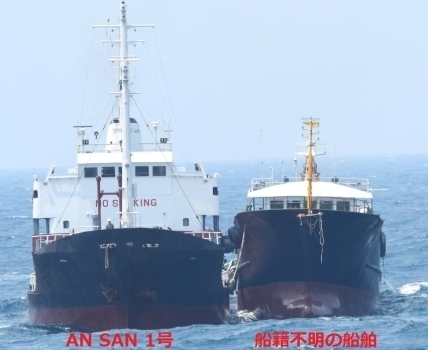 |
|
A North Korean vessel violates UN sanctions by receiving petroleum products in international waters in the East China Sea on June 29. (provided by Japan’s Ministry of Foreign Affairs)
|
UN report says North Korea continues nuclear and missile programs while violating sanctions
North Korea’s primary means of evading UN sanctions is by transferring petroleum from one ship to another in international waters, a panel of UN experts said in a new report. This report was published amidst extensive press coverage of claims that North Korea has been illegally importing refined petroleum products from China and Russia, which has elicited stern warnings from the US. According to AFP, the report, which is composed every six months by an expert panel that reviews the implementation of UN sanctions, was submitted to the UN Security Council Sanctions Committee on North Korea on Aug. 3. “[North Korea] has not stopped its nuclear and missile programs and continued to defy Security Council resolutions through a massive increase in illicit ship-to-ship transfers of petroleum products, as well as through transfers of coal at sea during 2018,” the panel wrote in its report. “The transfer of petroleum products to North Korean tankers at sea remains ‘a primary method of sanctions evasion,’” AFP said, quoting the report. The panel also said that 40 ships and 130 companies were involved in these ship-to-ship transfers and that the transfers were gradually increasing in scale and sophistication. The report introduced some of the specific methods used, such as turning off ships’ location-tracking system, camouflaging the ships and using small boats. The US has recently been sounding the alarm about illegal ship-to-ship transfers. A report that the US submitted to the sanctions committee on July 12 claimed that North Korea had received refined petroleum products on at least 89 occasions through such transfers in international waters between January and May and asked the committee to ban exports of refined petroleum to North Korea through the end of the year. After North Korea launched the Hwasong-15 intercontinental ballistic missile (ICBM), which is capable of hitting the East Coast of the US, the UN Security Council passed resolution No. 2397 in Dec. 2017, which capped North Korea’s imports of refined petroleum products to 500,000 barrels. During the foreign ministers’ meeting at the ASEAN Regional Forum, held in Singapore on Aug. 4, US Secretary of State Mike Pompeo urged ASEAN member states to strictly abide by all the sanctions and to more specifically shut off the influx of petroleum products to North Korea through ship-to-ship transfers. By Hwang Joon-bum, Washington correspondent Please direct comments or questions to [english@hani.co.kr]






